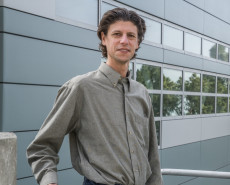The Defense Advanced Research Projects Agency (DARPA) has named Berkeley Lab’s cybersecurity expert Sean Peisert to the Information Science and Technology (ISAT) Study Group for a three-year term beginning this summer. The group brings 30 of the brightest scientists and engineers together to identify new areas of development in computer and communication technologies and to recommend future research directions.
For sixty years, DARPA has held to a singular and enduring mission: to make pivotal investments in breakthrough technologies for national security. The ISAT Study Group was established by DARPA in 1987 to support its technology offices and provide a continuing and independent assessment of the state of advanced information science and technology as it relates to the U.S. Department of Defense.
“I am deeply honored to be named to the ISAT study group; and for the opportunity to work alongside leading experts from, academia, government, the national labs, and industry, including some that I’ve admired for a long time,” said Peisert. “One of the cool things about DARPA is that they focus on really hard, moderately crazy problems, but ones that are tractable, that the performers can make huge progress on in three years.”
Peisert notes that in the recent past he’s admired DARPA projects like Brandeis, which aims to advance individual privacy protections, High-Assurance Cyber Military Systems (HACMS), which used a “clean-slate, formal-methods approach” to developing autonomous systems, and Rapid Attack Detection, Isolation and Characterization Systems (RADICS), which is exploring ways to protect the nation’s electrical grid from cyber attack.
“I’ve been working in the cybersecurity field for a while now, and I think we’ve made some interesting progress in technologies that underlie computer security, including the use of “safer” programming languages like Rust, formal methods for industrial applications, novel security architectures in computer processors, applications of differential privacy, secure multiparty computation, homomorphic encryption, and more,” said Peisert. “These advancements have created a possibility for a golden age of privacy and security if the right amount of resources are applied to bring these technologies to bear. With some concerted effort coming from the federal government we could apply this technology broadly from phones to critical power systems, I think the next three to five, and even 10 years could be really exciting.”
At Berkeley Lab, Peisert leads the computer security research and development group in the computational research division. His current research and development interests cover a broad cross-section of usable and useful computer security and privacy solutions, particularly in enabling secure and privacy-preserving scientific data analysis, and improving security in high-performance computing systems, and power grid control systems. He also co-led the Cybersecurity via Inverter-Grid Automatic Reconfiguration (CIGAR) project, a recently completed Lab effort aimed at providing security protections for emerging power systems.
In addition to his roles at Berkeley Lab, Peisert is both an associate adjunct professor of computer science at the University of California, Davis (UC Davis) and of health informatics at the UC Davis School of Medicine. He is also chief cybersecurity strategist for CENIC; a co-lead of Trusted CI, the NSF Cybersecurity Center of Excellence; editor-in-chief of IEEE Security & Privacy; member of the Distinguished Expert Review Panel for the NSA Annual Best Scientific Cybersecurity Paper Competition; a steering committee member and past general chair of the New Security Paradigms Workshop (NSPW); steering committee member and past program co-chair of the USENIX Workshop on Cyber Security Experimentation and Test (CSET); and steering committee member and past general chair for the IEEE Symposium on Security and Privacy, the flagship conference for security research.
About Berkeley Lab
Founded in 1931 on the belief that the biggest scientific challenges are best addressed by teams, Lawrence Berkeley National Laboratory and its scientists have been recognized with 16 Nobel Prizes. Today, Berkeley Lab researchers develop sustainable energy and environmental solutions, create useful new materials, advance the frontiers of computing, and probe the mysteries of life, matter, and the universe. Scientists from around the world rely on the Lab’s facilities for their own discovery science. Berkeley Lab is a multiprogram national laboratory, managed by the University of California for the U.S. Department of Energy’s Office of Science.
DOE’s Office of Science is the single largest supporter of basic research in the physical sciences in the United States, and is working to address some of the most pressing challenges of our time. For more information, please visit energy.gov/science.










